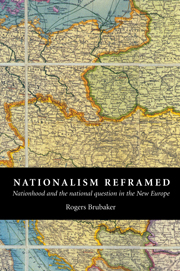Book contents
- Frontmatter
- Contents
- Acknowledgments
- Introduction
- Part I Rethinking nationhood and nationalism
- Part II The old “New Europe” and the new
- 4 Nationalizing states in the old “New Europe” – and the new
- 5 Homeland nationalism in Weimar Germany and “Weimar Russia”
- 6 Aftermaths of empire and the unmixing of peoples
- Bibliography
- Index
4 - Nationalizing states in the old “New Europe” – and the new
Published online by Cambridge University Press: 06 July 2010
- Frontmatter
- Contents
- Acknowledgments
- Introduction
- Part I Rethinking nationhood and nationalism
- Part II The old “New Europe” and the new
- 4 Nationalizing states in the old “New Europe” – and the new
- 5 Homeland nationalism in Weimar Germany and “Weimar Russia”
- 6 Aftermaths of empire and the unmixing of peoples
- Bibliography
- Index
Summary
Nationalism can be understood as a form of remedial political action. It addresses an allegedly deficient or “pathological” condition and proposes to remedy it. The discourse that frames, and in part constitutes, nationalist political action – and the subdiscursive sentiments which nationalist political stances seek to mobilize and evoke – can be conceived as a set of variations on a single core lament: that the identity and interests of a putative nation are not properly expressed or realized in political institutions, practices, or policies.
This allegedly deficient condition comes in two basic forms: a nation may be held to lack an adequate polity, or a polity may be held to lack an adequate national base. Two corresponding types of nationalism may be distinguished: polity-seeking or polity-upgrading nationalisms that aim to establish or upgrade an autonomous national polity; and polity-based, nation-shaping (or nation-promoting) nationalisms that aim to nationalize an existing polity.
The literature on nationalism as a form of politics – leaving aside the broader literature on nationalism as an idea, or sentiment, or state of mind – has focused on polity-seeking nationalist movements, paying much less attention to the nationalization of existing polities. This chapter reverses the emphasis. It develops a framework for the analysis of what I call “nationalizing states.” These are states that are conceived by their dominant elites as nation-states, as the states of and for particular nations, yet as “incomplete” or “unrealized” nation-states, as insufficiently “national” in a variety of senses to be explored below.
- Type
- Chapter
- Information
- Nationalism ReframedNationhood and the National Question in the New Europe, pp. 79 - 106Publisher: Cambridge University PressPrint publication year: 1996
- 4
- Cited by



